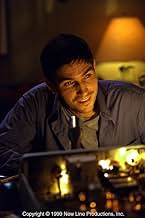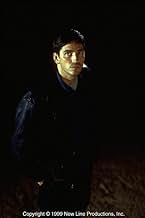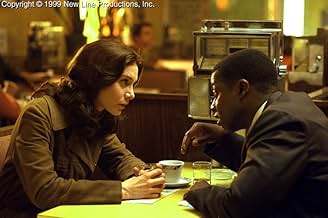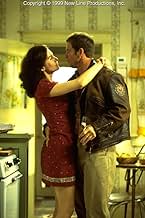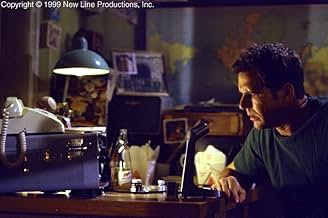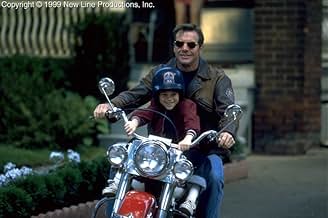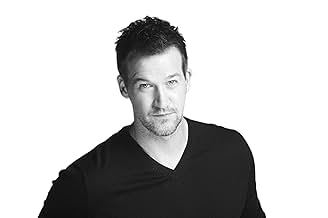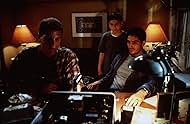Un lien radio traversant accidentellement le temps relie un père et son fils à 30 ans d'intervalle. Le fils tente de sauver la vie de son père, mais doit ensuite gérer les conséquences.Un lien radio traversant accidentellement le temps relie un père et son fils à 30 ans d'intervalle. Le fils tente de sauver la vie de son père, mais doit ensuite gérer les conséquences.Un lien radio traversant accidentellement le temps relie un père et son fils à 30 ans d'intervalle. Le fils tente de sauver la vie de son père, mais doit ensuite gérer les conséquences.
- Récompenses
- 2 victoires et 8 nominations au total
Avis à la une
10dribe
The plot in Frequency is hard to believe, but the movie's twists, action, and dramatic moments cover up its uncertainties. The idea of how the past affects the future is not original, but the rest of the film is.
When I first saw the preview for Frequency, I thought that the idea of a son talking to a his deceased father over a radio was original and interesting. I didn't think, however, that the film would be very good. I was wrong though. The movie is packed with action, mystery, twists, and emotion. The love between the father and son is so real, as are the characters themselves.
Frequency uses remarkable use of film's ability to stretch out moments of time and intercut between different events. And as far as timing goes, this movie has stopwatch-precision. As a result, it can produce tears, outbursts of laughter, or dropping jaws in the audience.
I think the ending of the movie could be improved, but I still highly recommend seeing this film. As long as you don't worry too much about the plausibility of the time-lapse details, you'll enjoy it. After all, it's entertainment in its finest form.
When I first saw the preview for Frequency, I thought that the idea of a son talking to a his deceased father over a radio was original and interesting. I didn't think, however, that the film would be very good. I was wrong though. The movie is packed with action, mystery, twists, and emotion. The love between the father and son is so real, as are the characters themselves.
Frequency uses remarkable use of film's ability to stretch out moments of time and intercut between different events. And as far as timing goes, this movie has stopwatch-precision. As a result, it can produce tears, outbursts of laughter, or dropping jaws in the audience.
I think the ending of the movie could be improved, but I still highly recommend seeing this film. As long as you don't worry too much about the plausibility of the time-lapse details, you'll enjoy it. After all, it's entertainment in its finest form.
This unique and interesting film is actually more of a suspense thriller than a science fiction, although I think fans of both genres will be pleased.
Dennis Quaid plays a heroic firefighter who was killed trying to rescue a runaway from a burning warehouse during the days of the Amazing Mets' World Series victory in October 1969. Jim Caviezel ("The Thin Red Line") plays his son, now a cop, thirty years later. Through some quirk of physics involving abnormal solar activity and the Aurora Borealis, the two make contact with each other across the 30-year span over a ham radio. The son is able to prevent his father's death, but changing the past also turns out to have unexpected consequences with which the two must deal.
The film really works on all levels with good action sequences and suspense, a nice dose of humor and some very touching exchanges between father and son. It explores the "what if" scenario of one's being presented with the opportunity to change an event in the past and the way in which those affected must deal with the consequences in a very intelligent and thought-provoking manner.
The acting is uniformly strong, with Quaid very appealing as the courageous firefighter and loving father who has an almost-childlike love for baseball (he even pulls off a Brooklyn accent nicely!); Caviezel is equally good as the present day version of Quaid's character's son. Caviezel brings a subtle sadness to the character, a quality one might expect from someone whose life hasn't quite worked out quite as well as it might have, possibly due to a void created by the absence of his father. One of the strongest aspects of Caviezel's performance was a subtle shift in personality following the changing of events in the past (a change which left him with memories both of his father's death and of time spent with his father in the intervening years).
I have a good feeling about this film and think it has a chance to be a real surprise hit. It's certainly one of the best films of the year thus far.
Dennis Quaid plays a heroic firefighter who was killed trying to rescue a runaway from a burning warehouse during the days of the Amazing Mets' World Series victory in October 1969. Jim Caviezel ("The Thin Red Line") plays his son, now a cop, thirty years later. Through some quirk of physics involving abnormal solar activity and the Aurora Borealis, the two make contact with each other across the 30-year span over a ham radio. The son is able to prevent his father's death, but changing the past also turns out to have unexpected consequences with which the two must deal.
The film really works on all levels with good action sequences and suspense, a nice dose of humor and some very touching exchanges between father and son. It explores the "what if" scenario of one's being presented with the opportunity to change an event in the past and the way in which those affected must deal with the consequences in a very intelligent and thought-provoking manner.
The acting is uniformly strong, with Quaid very appealing as the courageous firefighter and loving father who has an almost-childlike love for baseball (he even pulls off a Brooklyn accent nicely!); Caviezel is equally good as the present day version of Quaid's character's son. Caviezel brings a subtle sadness to the character, a quality one might expect from someone whose life hasn't quite worked out quite as well as it might have, possibly due to a void created by the absence of his father. One of the strongest aspects of Caviezel's performance was a subtle shift in personality following the changing of events in the past (a change which left him with memories both of his father's death and of time spent with his father in the intervening years).
I have a good feeling about this film and think it has a chance to be a real surprise hit. It's certainly one of the best films of the year thus far.
Several films have deal with changing the past and the ensuing effects on the future. "Back to the Future", "Timecop", and "The Final Countdown" come immediately to mind. Director Gregory Hoblit (his "Fallen" (1998)and "Primal Fear" (1996) were both excellent) explores that theme again in "Frequency". But writer Toby Emmerich (in his first writing credit), puts a different spin on the theme. In most 'changing the past' films, a character goes back in time. In "Frequency", one main character lives in 1999 while another lives in 1969--and you see the actions in 1969 immediately affecting 1999. Sounds confusing, huh? Well, it is. But it works.
The movie opens with the introduction of the Sullivan family. Frank (Dennis Quaid) is a heroic New York firefighter, and escapes a harrowing situation to return home to his wife and his 6-year-old son John. It's an exciting time in New York, as the 'Miracle Mets' have made the World Series. Frank is a ham radio user, and a strange disturbance in the sky (solar flares, I believe. I never took astronomy) in the sky has really increased the range of his radio. "I'm reaching people I've never reached before", he says. Flash forward to 1999, when young John has grown up into a 36-year-old NY homicide detective (James Caviezel) with relational problems (and possibly a drinking problem as well). We learn his father died several years earlier in a warehouse fire, and it's obvious that John has never really gotten over it. He ends up setting up the old ham radio (did I mention that the solar flares are back?), and contacts a fellow New Yorker named Frank. It certainly won't ruin any big surprise when I tell you that it's his father Frank--in 1969. After recovering from his astonishment and convincing his father who he really is (his knowledge of the 1969 World Series proves quite helpful), they begin a series of nightly conversations. Unfortunately, their conversations change the past--and the future--in very dangerous ways. A serial killer who should only have 3 victims suddenly has more, and John must use his knowledge of the crimes (30 years old to him) to guide his dad in a 1969 pursuit of the killer. And the chase is on. Will they stop the killer? Will the solar flares last long enough for them to finish their plan? Will anyone in 1999 or 1969 believe them?
That lengthy 'plot summary' really didn't ruin any of the suspense--or come close to explaining the whole story. So, it goes without saying that the story is pretty convoluted and involved. But it's not hard to follow, and the movie grabbed me and kept me interested throughout. Granted, you will need to use a serious amount of 'suspension of disbelief'. If you get hung up on "there's no way they could be talking to each other" or "changes in the past wouldn't immediately appear in the future--they would have already happened and would have been there all along", you'll do 2 things: (1) you'll give yourself a headache, and (2) you'll miss out on a very entertaining film. The reason I gave this more stars than last week's "U-571"? I cared about the characters, and I found "Frequency" much more entertaining. Also, the story was quite original--with great use of the Miracle Mets and the 1969 World Series throughout.
Speaking of the characters--Quaid and Caviezel both do great work. Their conversations via radio are very touching and authentic (once you accept the general premise, of course). Although Quaid is a 'movie star', don't let that fool you--he's a very good (and probably underrated) actor. Just watch him as Doc Holliday in "Wyatt Earp" (1994), Remy McSwain in "The Big Easy" (1987), or Gordo Cooper in "The Right Stuff" (1983) if you don't believe me. And Caviezel's a real up-and-comer (1998's "The Thin Red Line"). He does a great job as a grieving son who is reunited (in a way) with his father, but watches his joy dissipate in the face of the mess he's created. He also believably portrays a character who has memories of the way things were, but is now bombarded with 'new' memories of the way things have become. The other characters are definitely secondary, but Elizabeth Mitchell as wife/mom Julia, and Andre Braugher (TV's "Homicide", 1998's "City of Angels", and 1989's "Glory") as Frank's policeman friend Satch are both solid.
This film has some decent action/suspense scenes, and 1999 John's radio conversation with his buddy Gordo (in 1969) is very funny. There have certainly been better action/suspense/serial killer movies (the action scenes weren't amazing, the story has some holes, and I thought the ending was a little cheesy), but the heart of the film is the relationship between Frank and John. I bought into that relationship fully, and that's why I liked this film as much as I did. And that's why I definitely recommend seeing "Frequency".
The movie opens with the introduction of the Sullivan family. Frank (Dennis Quaid) is a heroic New York firefighter, and escapes a harrowing situation to return home to his wife and his 6-year-old son John. It's an exciting time in New York, as the 'Miracle Mets' have made the World Series. Frank is a ham radio user, and a strange disturbance in the sky (solar flares, I believe. I never took astronomy) in the sky has really increased the range of his radio. "I'm reaching people I've never reached before", he says. Flash forward to 1999, when young John has grown up into a 36-year-old NY homicide detective (James Caviezel) with relational problems (and possibly a drinking problem as well). We learn his father died several years earlier in a warehouse fire, and it's obvious that John has never really gotten over it. He ends up setting up the old ham radio (did I mention that the solar flares are back?), and contacts a fellow New Yorker named Frank. It certainly won't ruin any big surprise when I tell you that it's his father Frank--in 1969. After recovering from his astonishment and convincing his father who he really is (his knowledge of the 1969 World Series proves quite helpful), they begin a series of nightly conversations. Unfortunately, their conversations change the past--and the future--in very dangerous ways. A serial killer who should only have 3 victims suddenly has more, and John must use his knowledge of the crimes (30 years old to him) to guide his dad in a 1969 pursuit of the killer. And the chase is on. Will they stop the killer? Will the solar flares last long enough for them to finish their plan? Will anyone in 1999 or 1969 believe them?
That lengthy 'plot summary' really didn't ruin any of the suspense--or come close to explaining the whole story. So, it goes without saying that the story is pretty convoluted and involved. But it's not hard to follow, and the movie grabbed me and kept me interested throughout. Granted, you will need to use a serious amount of 'suspension of disbelief'. If you get hung up on "there's no way they could be talking to each other" or "changes in the past wouldn't immediately appear in the future--they would have already happened and would have been there all along", you'll do 2 things: (1) you'll give yourself a headache, and (2) you'll miss out on a very entertaining film. The reason I gave this more stars than last week's "U-571"? I cared about the characters, and I found "Frequency" much more entertaining. Also, the story was quite original--with great use of the Miracle Mets and the 1969 World Series throughout.
Speaking of the characters--Quaid and Caviezel both do great work. Their conversations via radio are very touching and authentic (once you accept the general premise, of course). Although Quaid is a 'movie star', don't let that fool you--he's a very good (and probably underrated) actor. Just watch him as Doc Holliday in "Wyatt Earp" (1994), Remy McSwain in "The Big Easy" (1987), or Gordo Cooper in "The Right Stuff" (1983) if you don't believe me. And Caviezel's a real up-and-comer (1998's "The Thin Red Line"). He does a great job as a grieving son who is reunited (in a way) with his father, but watches his joy dissipate in the face of the mess he's created. He also believably portrays a character who has memories of the way things were, but is now bombarded with 'new' memories of the way things have become. The other characters are definitely secondary, but Elizabeth Mitchell as wife/mom Julia, and Andre Braugher (TV's "Homicide", 1998's "City of Angels", and 1989's "Glory") as Frank's policeman friend Satch are both solid.
This film has some decent action/suspense scenes, and 1999 John's radio conversation with his buddy Gordo (in 1969) is very funny. There have certainly been better action/suspense/serial killer movies (the action scenes weren't amazing, the story has some holes, and I thought the ending was a little cheesy), but the heart of the film is the relationship between Frank and John. I bought into that relationship fully, and that's why I liked this film as much as I did. And that's why I definitely recommend seeing "Frequency".
FREQUENCY / (2000) ***1/2
It' 1999. Jim Caviezel stars as John Sullivan, a detective whose life is falling apart. Recently, he has split up from his girlfriend, he and his police partner Satch (Andre Braugher), are unable to solve a serial murder case that has been reopened due to the discovery of skeletal remains of a past victim. The thirty year anniversary of the death of his firefighter father (Dennis Quaid), is also approaching. John is beginning to sink in a pit of despair.
One night John stumbles upon his dad's old ham radio. He makes an effort to get the machine to power up once again. When he does and begins conversations with another operator, however, he realizes the person he is communicating with is his long dead father. Somehow, due to the presence of the Northern Lights, John is able to transmit back in time to 1969 and literally alter the course of his existence.
The concept of time traveling communication may seem far-fetched to some, and "Frequency" is a little hard to grasp at times, especially when the film never directly explains why the father and son are able to talk with each other through time. Notwithstanding, the production works as a science fiction thriller with supernatural overtones. While the filmmakers do succeed in convincingly constructing "Frequency," most audiences might have to leave logic at the theater entrance before viewing it.
"Frequency" is a well-structured motion picture; the movie is focused throughout. Although its story changes pace at different periods, for the most part the audience can follow along with the characters. This is a movie with a complicated and challenging story. Because of the film's complexity, we are enormously involved, if slightly confused. Screenwriter Tobias Emmerich links original and fresh feeling material here. Gregory Hoblit produces the right amount of action and suspense, combined with gentle emotions, to generate a film we have not seen before.
Dennis Quaid and James Caviezel are the perfect choices for the principal characters. Quaid performs with intriguing tension and appropriate receptivity. Caviezel dazzles with intricacy and dexterity. Offering refined supporting roles are Andre Braugher ("City of Angels", "Get on the Bus") and Noah Emmerich ("The Truman Show") who furnishes some light-hearted material as John's best friend.
Director Gregory Hoblit ("Fallen," "Primal Fear") clearly executes topics on screen. This film is overflowing with ideas and contains enough plot for a television series. However, "Frequency" is not without flaws. Sullivan's chaotic life is only vaguely portrayed. Although we do care for the character, more development would increase the relationship between the audience and he. Some of the make-up effects depicting age differences were disgraceful. Andre Braugher appeared as if his make up artists were straight out of junior high, slapping too much pancake cream plaster on him. The film's contrived climax concludes with a formalistic fight instead of continuing its battle of wits.
Despite a few unacceptable external problems, internally this is a very effective production. As a whole, "Frequency" contains a very encompassing story and places interesting characters in engaging circumstances. The movie is definitely worthy of recognition, but do not view it unless you plan on thoroughly discussing it afterwards.
It' 1999. Jim Caviezel stars as John Sullivan, a detective whose life is falling apart. Recently, he has split up from his girlfriend, he and his police partner Satch (Andre Braugher), are unable to solve a serial murder case that has been reopened due to the discovery of skeletal remains of a past victim. The thirty year anniversary of the death of his firefighter father (Dennis Quaid), is also approaching. John is beginning to sink in a pit of despair.
One night John stumbles upon his dad's old ham radio. He makes an effort to get the machine to power up once again. When he does and begins conversations with another operator, however, he realizes the person he is communicating with is his long dead father. Somehow, due to the presence of the Northern Lights, John is able to transmit back in time to 1969 and literally alter the course of his existence.
The concept of time traveling communication may seem far-fetched to some, and "Frequency" is a little hard to grasp at times, especially when the film never directly explains why the father and son are able to talk with each other through time. Notwithstanding, the production works as a science fiction thriller with supernatural overtones. While the filmmakers do succeed in convincingly constructing "Frequency," most audiences might have to leave logic at the theater entrance before viewing it.
"Frequency" is a well-structured motion picture; the movie is focused throughout. Although its story changes pace at different periods, for the most part the audience can follow along with the characters. This is a movie with a complicated and challenging story. Because of the film's complexity, we are enormously involved, if slightly confused. Screenwriter Tobias Emmerich links original and fresh feeling material here. Gregory Hoblit produces the right amount of action and suspense, combined with gentle emotions, to generate a film we have not seen before.
Dennis Quaid and James Caviezel are the perfect choices for the principal characters. Quaid performs with intriguing tension and appropriate receptivity. Caviezel dazzles with intricacy and dexterity. Offering refined supporting roles are Andre Braugher ("City of Angels", "Get on the Bus") and Noah Emmerich ("The Truman Show") who furnishes some light-hearted material as John's best friend.
Director Gregory Hoblit ("Fallen," "Primal Fear") clearly executes topics on screen. This film is overflowing with ideas and contains enough plot for a television series. However, "Frequency" is not without flaws. Sullivan's chaotic life is only vaguely portrayed. Although we do care for the character, more development would increase the relationship between the audience and he. Some of the make-up effects depicting age differences were disgraceful. Andre Braugher appeared as if his make up artists were straight out of junior high, slapping too much pancake cream plaster on him. The film's contrived climax concludes with a formalistic fight instead of continuing its battle of wits.
Despite a few unacceptable external problems, internally this is a very effective production. As a whole, "Frequency" contains a very encompassing story and places interesting characters in engaging circumstances. The movie is definitely worthy of recognition, but do not view it unless you plan on thoroughly discussing it afterwards.
You can't help it!! You have to cheer and applaud this movie. I can't remember the last time the whole audience clapped at the end of a movie. It has been such a long time since a movie was made that warmed your heart, while keeping you at the edge of your seat. This movie will make you laugh, get a little misty in the eyes, and you won't even notice the time. You're almost sad to see it end. Dennis Quaid is excellent, this is his best movie in years. This movie also has some new faces you won't soon forget. Don't take my word on this, see it your self. You will be thinking about this movie for weeks.
Le saviez-vous
- AnecdotesIn the warehouse fire scene, all the firefighters except Dennis Quaid, Peter MacNeill and Jordan Bridges are real.
- Gaffes(at around 5 mins) In the 1969 segment, there is a glance of a record collection where you can clearly see the "Elvis Presley In Concert" double album, which was released in 1977.
- Bandes originalesCrimson and Clover
Written by Tommy James (as Thomas Gregory Jackson) and Peter P. Lucia Jr.
Performed by Tommy James and Tommy James & The Shondells
Courtesy of Rhino Entertainment Co.
By Arrangement with Warner Special Products
Meilleurs choix
Connectez-vous pour évaluer et suivre la liste de favoris afin de recevoir des recommandations personnalisées
- How long is Frequency?Alimenté par Alexa
Détails
Box-office
- Budget
- 31 000 000 $US (estimé)
- Montant brut aux États-Unis et au Canada
- 45 010 278 $US
- Week-end de sortie aux États-Unis et au Canada
- 9 025 584 $US
- 30 avr. 2000
- Montant brut mondial
- 68 106 245 $US
- Durée1 heure 58 minutes
- Couleur
- Mixage
- Rapport de forme
- 2.35 : 1
Contribuer à cette page
Suggérer une modification ou ajouter du contenu manquant

Lacune principale
What was the official certification given to Fréquence interdite (2000) in Japan?
Répondre

